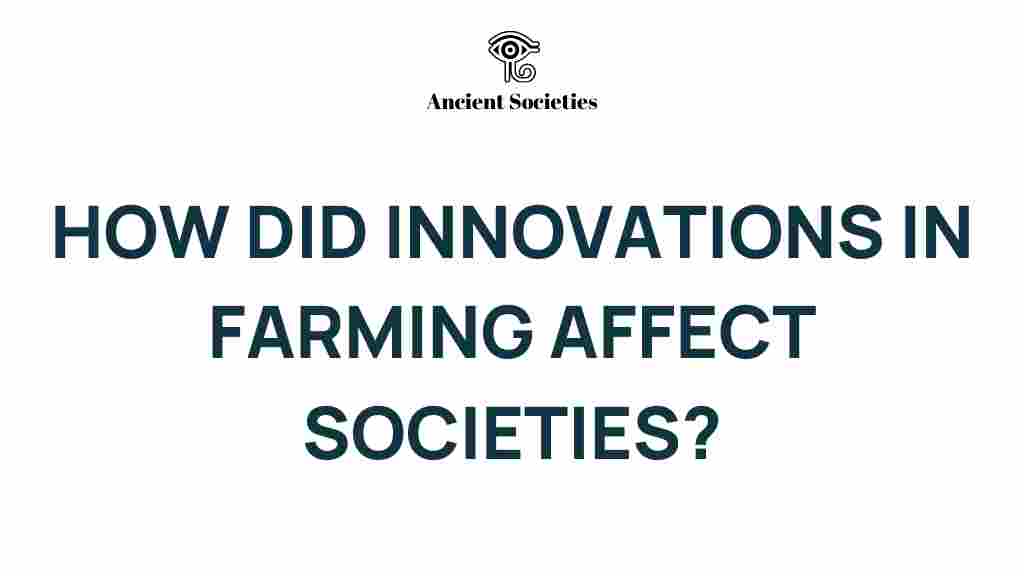The Roots of Change: How Farming Innovations Shaped Societies
The history of agriculture is a fascinating journey that reveals how farming innovations have significantly influenced the development of societies. From the advent of the Agricultural Revolution to modern sustainable practices, each step in agricultural evolution has had profound societal impacts. This article explores the evolution of farming, the development of crops, and how these advancements have contributed to civilization growth and enhanced food production.
Understanding Farming Innovations
Farming innovations refer to the new techniques and technologies introduced in agriculture that improve efficiency, yield, and sustainability. Historically, these innovations have transformed the way societies function, feeding larger populations and allowing for urbanization and the rise of civilizations. Key elements of farming innovations include:
- Crop Development: The selective breeding of plants to enhance yield and disease resistance.
- Mechanization: The use of machines to increase efficiency and reduce manual labor.
- Sustainable Practices: Techniques that promote environmental health, such as crop rotation and organic farming.
The Agricultural Revolution and Its Impact
The Agricultural Revolution, which began around 10,000 BC, marked a significant turning point in human history. During this time, societies transitioned from nomadic lifestyles to settled agricultural communities. This shift had several key effects:
- Population Growth: With reliable food sources, populations began to grow, leading to the establishment of villages and towns.
- Social Structures: Permanent settlements allowed for the development of complex social hierarchies and governance systems.
- Trade and Economy: Surplus food production enabled trade, fostering economic growth and cultural exchanges.
Key Farming Innovations Throughout History
Over the centuries, farming innovations have played a crucial role in shaping societies. Here are some notable advancements:
- Plow Invention: The introduction of the plow allowed for more efficient soil cultivation, leading to higher crop yields.
- Irrigation Systems: The development of irrigation techniques enabled farmers to cultivate arid lands, expanding agricultural possibilities.
- Crop Rotation: This practice helped maintain soil fertility and reduced pest and disease occurrences.
- Genetic Engineering: In recent decades, advancements in biotechnology have led to genetically modified organisms (GMOs) that enhance crop resilience and production.
The Societal Impact of Farming Innovations
As farming innovations continued to evolve, their societal impacts became more pronounced. Here are some key areas where these innovations made a difference:
Civilization Growth
With improved food production capabilities, societies could support larger populations. This led to:
- Urbanization: As food became more abundant, people migrated to cities, leading to the rise of urban centers.
- Specialization of Labor: Surplus food allowed individuals to pursue different trades, resulting in skilled artisans and professionals.
- Cultural Development: The concentration of people in urban areas fostered cultural exchanges, innovations in art, science, and philosophy.
Food Production and Security
Farming innovations have played a crucial role in enhancing food production, which is vital for societal stability. Some impacts include:
- Increased Food Security: With more efficient farming methods, societies can produce enough food to sustain their populations.
- Diverse Diets: Crop development has led to a variety of food options, improving nutrition and health.
- Economic Growth: A robust agricultural sector contributes significantly to national economies.
Challenges and Solutions in Modern Farming
Despite the benefits of farming innovations, modern agriculture faces several challenges, including:
- Climate Change: Altered weather patterns affect crop yields and farming practices.
- Soil Degradation: Intensive farming can lead to soil erosion and nutrient depletion.
- Pesticide Resistance: Overreliance on chemical pesticides can result in resistant pests and diseases.
To address these challenges, farmers and researchers are exploring solutions such as:
- Agroecology: Promoting biodiversity and sustainable practices to enhance ecosystem health.
- Precision Agriculture: Using technology and data analytics to optimize farming practices.
- Organic Farming: Reducing chemical inputs to improve soil health and sustainability.
Conclusion
Farming innovations have profoundly shaped the course of human history, impacting societies in ways that are still felt today. From the Agricultural Revolution to modern sustainable practices, these advancements have enabled civilization growth, improved food production, and influenced social structures. As we face new challenges in agriculture, embracing innovative and sustainable practices will be essential for future prosperity.
For more information about sustainable agriculture practices, visit this resource.
To delve deeper into the history of agriculture and its societal impacts, check out this article.
This article is in the category History and created by AncientSocieties Team
